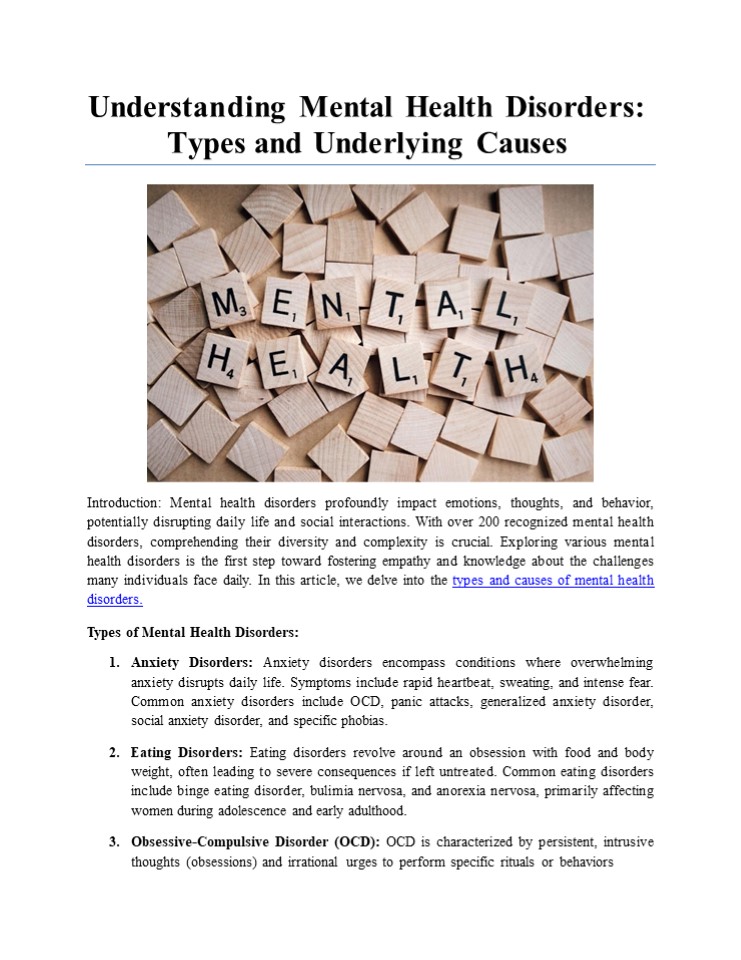Understanding Mental Health Disorders: Types and Underlying Causes - PowerPoint PPT Presentation
Title:
Understanding Mental Health Disorders: Types and Underlying Causes
Description:
This article provides a concise overview of mental health disorders, focusing on their types and underlying causes. It highlights common disorders such as anxiety, eating disorders, OCD, PTSD, and psychotic disorders, describing their symptoms and impacts. The article also underscores that these conditions can arise from a complex interplay of genetic, environmental, and psychological factors, making them challenging to pinpoint. It encourages seeking professional help for individuals displaying concerning symptoms, emphasizing the need for comprehensive evaluation and personalized treatment for mental health issues. – PowerPoint PPT presentation
Number of Views:0
Date added: 2 November 2023
Slides: 3
Provided by:
YourPsychologist
Category:
Medicine, Science & Technology
Tags:
Title: Understanding Mental Health Disorders: Types and Underlying Causes
1
Understanding Mental Health Disorders Types and
Underlying Causes
- Introduction Mental health disorders profoundly
impact emotions, thoughts, and behavior,
potentially disrupting daily life and social
interactions. With over 200 recognized mental
health disorders, comprehending their diversity
and complexity is crucial. Exploring various
mental health disorders is the first step toward
fostering empathy and knowledge about the
challenges many individuals face daily. In this
article, we delve into the types and causes of
mental health disorders. - Types of Mental Health Disorders
- Anxiety Disorders Anxiety disorders encompass
conditions where overwhelming anxiety disrupts
daily life. Symptoms include rapid heartbeat,
sweating, and intense fear. Common anxiety
disorders include OCD, panic attacks, generalized
anxiety disorder, social anxiety disorder, and
specific phobias. - Eating Disorders Eating disorders revolve around
an obsession with food and body weight, often
leading to severe consequences if left untreated.
Common eating disorders include binge eating
disorder, bulimia nervosa, and anorexia nervosa,
primarily affecting women during adolescence and
early adulthood. - Obsessive-Compulsive Disorder (OCD) OCD is
characterized by persistent, intrusive thoughts
(obsessions) and irrational urges to perform
specific rituals or behaviors
2
- (compulsions). Individuals with OCD struggle to
control these thoughts and behaviors, with
symptoms typically emerging during childhood or
early adulthood. - Post-Traumatic Stress Disorder (PTSD) PTSD can
develop after experiencing a life- threatening
event, such as physical or sexual assault, loss
of a loved one, or a natural disaster. Symptoms
may include flashbacks, emotional numbness, and
co-occurring conditions like anxiety and
depression. - Psychotic Disorders Psychotic disorders lead to
distorted thinking, often accompanied by
hallucinations or delusions. These episodes can
result in detachment from reality, distrust of
others, and risky behaviors. Treatment typically
involves medication and therapy. - Causes of Mental Health Disorders
- Mental health disorders can arise from various
biological, psychological, and environmental
factors, making it challenging to pinpoint a
single cause. Contributing factors include - Genetics A family history of mental disorders
increases the risk of developing one. - Brain Chemistry Changes in brain chemistry,
often triggered by substance addiction, can lead
to mental health problems. - Psychological Factors Unhealthy thought patterns
rooted in psychological variables and upbringing
can contribute to mental illnesses. - Environmental Factors Social disadvantages,
poverty, social isolation, discrimination, and
trauma (such as childhood abuse) can impact
mental health. - Bereavement The loss of a loved one can trigger
mental health issues. - Conclusion
- Mental health disorders vary in their duration
and intensity, with multiple causes and factors
influencing their development. This overview only
scratches the surface of a complex topic. If you
or someone you know exhibits concerning symptoms,
seeking professional help from a licensed mental
health expert is crucial. Mental health issues
require comprehensive evaluation and treatment
tailored to individual needs.


























![Eating Disorders: Assessment, Understanding, and Treatment Strategies [Day One] PowerPoint PPT Presentation](https://s3.amazonaws.com/images.powershow.com/A1261693805JcNbL.th0.jpg?_=20120716038)




